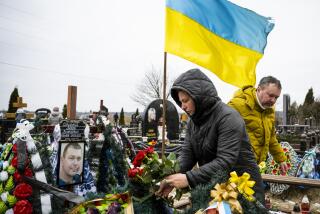NEWS ANALYSIS : Can Russians Deliver if Given Bigger Role in Balkans?
- Share via
MOSCOW — Russia’s scathing condemnation of NATO air strikes against Bosnian Serbs appears aimed at securing Moscow a more prominent role in mediating the Balkan conflict, but that quest for diplomatic glory may backfire if the Kremlin fails to bring its allies to heel.
Whether Russia succeeds in elevating its profile in the international arena hinges on how much influence it really wields with the intransigent Bosnian Serbs, who have a history of taking advantage of Moscow’s protection.
With neither the military means nor the public backing to get directly involved in the 4-year-old war racking the former Yugoslav federation, Russian President Boris N. Yeltsin and his government have resorted to fiery rhetoric to attack Western policy and demand that the North Atlantic Treaty Organization bombardments stop.
During NATO’s stepped-up air campaign of the past two weeks, Russia has steadily escalated its warnings that a new Cold War looms and that the Balkan crisis threatens to engulf all of Europe. And a grenade attack on the U.S. Embassy here Wednesday was attributed by Russian media to the bitter dispute over Bosnia, although there was no immediate claim of responsibility or explanation for the blast.
After the government Tuesday issued a statement accusing NATO of practicing “genocide” against the Bosnian Serbs, the White House dispatched Deputy Secretary of State Strobe Talbott to Moscow to try to calm the latest turbulence in U.S.-Russian relations. But diplomats and political analysts expect little to change as a result of today’s consultations because the issues separating the United States and Russia now extend far beyond the roiling Balkans.
Frustrated with its diminished power in the post-Communist era, Russia has seized on the NATO air strikes as grounds for obstructing the Western alliance’s plans to expand eastward and for avoiding compliance with international security agreements that will further reduce Russian military strength.
Defense officials have hinted for months that they are unlikely to meet a November deadline for compliance with the treaty on conventional forces in Europe. The treaty requires Russia to pull troops and equipment out of the volatile Caucasus region where it has been fighting separatists in Chechnya.
Talbott’s mission is expected to be more symbolic than successful. But diplomats here speculate that he may encourage the Kremlin to make use of its claimed inroads with the ostracized Bosnian Serbs to persuade them to withdraw artillery from around Sarajevo--NATO’s principal objective in bombing rebel positions.
Russians share a Slavic heritage and the Christian Orthodox religion with the Serbs but have little to gain strategically or politically by aligning themselves with Serb nationalists who rule shattered Balkan fiefdoms and draw international ire for having instigated the deadly conflict.
Beset with their own economic worries, average Russians have little sympathy for the Balkan militants and even less intention of taking part in their battles. Massive military defections and draft-dodging occurred after Moscow sent troops into Chechnya in December, and even stronger resistance could be expected were the Kremlin to involve itself in a foreign war.
Nevertheless, Russian politicians have turned NATO’s actions against the Serbs into a cause celebre as campaigns heat up in advance of parliamentary elections scheduled for Dec. 17.
Radical opposition leaders such as Vladimir V. Zhirinovsky--not to be outdone by Yeltsin’s harsh pronunciations--have demanded the firing of Foreign Minister Andrei V. Kozyrev, the unilateral breaching of United Nations sanctions against the rump Yugoslavia and the deployment of Russian warships to the Adriatic, which borders Bosnia-Herzegovina’s short coastline.
By putting the vital relationship between Moscow and Washington at stake in what is largely domestic political grandstanding, the Kremlin may succeed in forcing Western leaders to heed its opinions on how to approach the Balkan crisis. Indeed, NATO leaders Wednesday reportedly responded to both internal and external pressures by deciding not to expand the allied bombing campaign against the Bosnian Serbs.
Yeltsin has been pressing for an international peace conference on the Balkans to be held here next month, and Russian politicians of all persuasions have been trumpeting their clout with the Bosnian Serb gunmen now under fire by NATO.
Still, unless Russia’s relationship with the Serbs can translate into persuading them to withdraw heavy artillery from around Sarajevo and three other U.N. “safe areas” in Bosnia, its reputation as a major player on the international stage could suffer another setback.
“I don’t think Russia’s influence on the Serbs should be exaggerated,” said Andrei V. Kortunov, deputy director of the USA-Canada Institute in Moscow.
He pointed out the diplomatic black eye dealt to the Kremlin in April, 1994, when Russia’s special envoy for the Balkans at that time, Vitaly I. Churkin, was repeatedly deceived by Bosnian Serb leaders while acting as their intermediary with U.N. and European Union negotiators.
Although Russia has kept the door to the Bosnian Serb leadership open with its condemnation of NATO actions, Kortunov said, “there is also an element of risk involved” if Kremlin diplomatic initiatives fail to compel the Serbs to pull back from Sarajevo.
Some Russian political analysts have already conceded that their country’s influence has evaporated, and they counsel against vain efforts to recover Russia’s superpower profile.
“What are we in reality? What is our status in the international arena? Are we a superpower, or just a run-of-the-mill country?” asked Sergei K. Oznobishchev, director of the International Security Center, a think tank, in an essay in the newspaper Sevodnya on Wednesday about Russia’s dwindling authority.
“It appears counterproductive to seek to secure one’s superpower status only on a verbal level,” he said. “Yet this is what the cream of our diplomatic corps has wasted its efforts on for the past year.”
More to Read
Sign up for Essential California
The most important California stories and recommendations in your inbox every morning.
You may occasionally receive promotional content from the Los Angeles Times.














